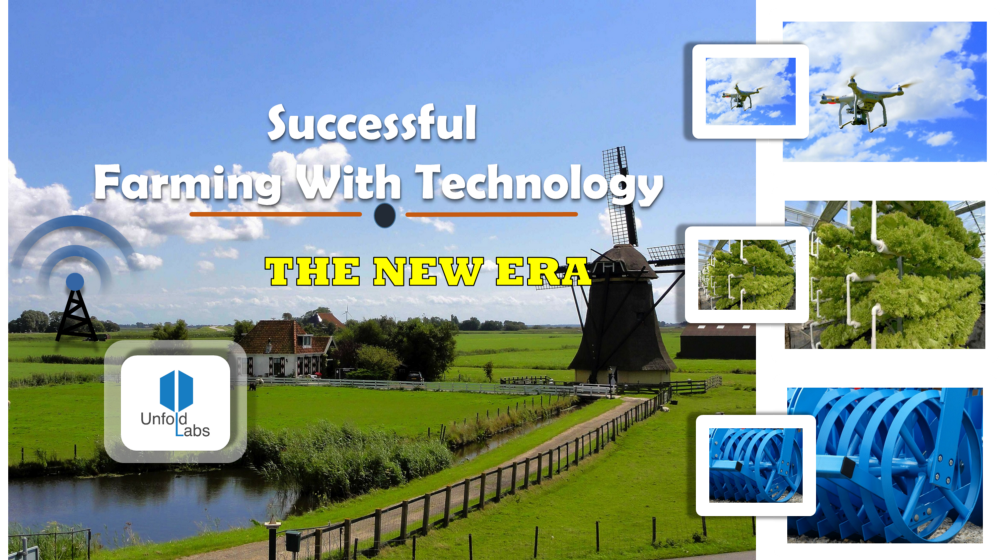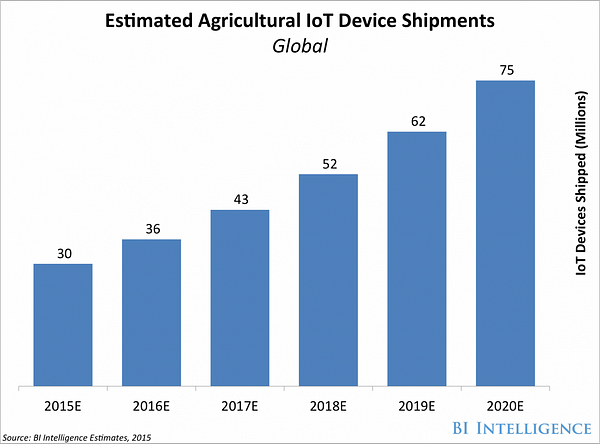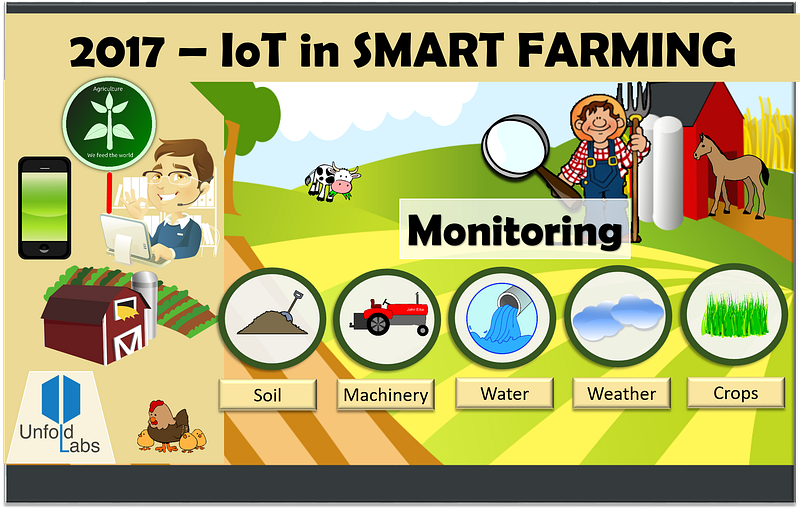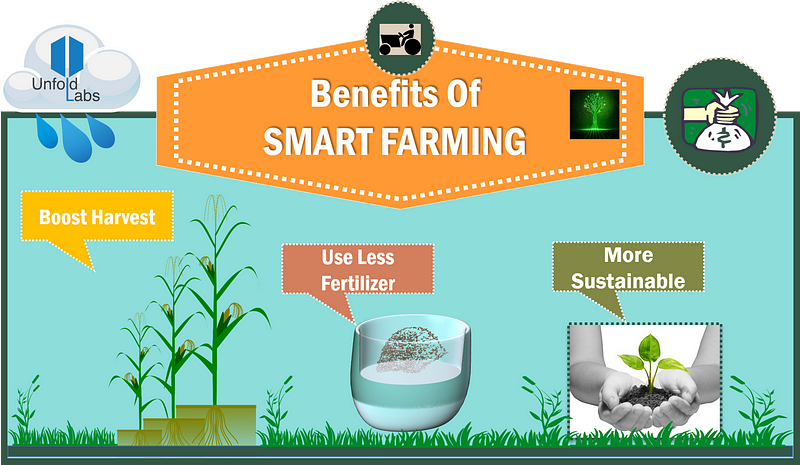Successful Farming with Technology - The New Era !

Technological advances in farming, which have greatly increased yields from cultivation, have evolved greatly through the years — each changing agricultural processes.
The first American agricultural revolution in the 1860s was characterized by the change from hand power to horses and the second American agricultural revolution in the 1940s was characterized by the change from horses to tractors, we are definitely entering a Third American Agricultural Revolution with Smart Farming or Precision Agriculture powered by Technology.

Business Insider estimates that agricultural IoT device shipments will reach an estimated 43 million in 2017 and increase to 75 million by 2020. IoT applications in agriculture are the future of farming as it can immensely impact the long-term survival of not only humans but animals as well.
Challenges in Agriculture Today
Though agriculture flourished with industrialization - it had its own challenges and pitfalls. Here are some of the challenges faced by the agriculture industry today.
- Cost of Farming - With agriculture highly industrialized today, petroleum not only powers the trucks and tractors, it is highly used for fertilizers and pesticides - which makes the cost of farming closer to the cost of oil.
- Farmlands - with the population explosion and growth of industrial factories, farmlands have been replaced by factories or houses due to urbanization. Land management techniques have played a role in not providing the best of the outputs from land towards farming output. Chemicals in farmlands have caused problems in cultivation.
- Water as a Resource - Agriculture production (fertilizers/pesticides/etc.,) has caused stress on water resources due to chemical pollution. The amount of ground water drawn for farming and population growth has depleted the water resources as well as effects of global warming.
- Wastage of Food - The United Nations estimates that about 33% of food is being wasted. This happens all through the ecosystem - from farming, post-harvest handling, processing, distribution and consumption. North America accounts for most of the food wastage comes from consumers wasting food.
- Government Mandates & Regulations - Lack of transparency, impact of navigating and complying to government regulations adds to unreasonable costs, is time consuming and deters implementation of innovation in agriculture.
Technology Leading the Way around the World
The 2016 Global Opportunity Report identifies Smart Farming, also known as Precision Agriculture, as the number one opportunity for businesses. Smart Farming includes Internet of Things (IoT), or connected devices that gather valuable data, that are helping farmers with the challenges that they face throughout the year.
IoT / Smarter devices are helping farmers to remotely monitor equipment, crops, and livestock; measure rainfall, soil moisture, or crop water demand; and obtain data on weather, water usage and livestock feeding & produce.
Countries all over the world have integrated IoT devices in agriculture as well. Countries with national programs include the UK, Germany, Malaysia, the Philippines, the Netherlands, Spain, and Kenya. Programs range from the enhancement of agri-food production to dike monitoring, using remote sensing to aid rice production, irrigation management and viticulture projects.
One of the countries where IoT is predicted to grow on a large scale is India, where over 50% of the population is dependent on agriculture. IoT applications are already being implemented for water resource management, laser-assisted precision land levelling, soil & plant monitoring, and for tracking temperature and humidity.
The National Association of Software and Services Companies (NASSCOM) and India's government have a join initiative focused on smart farming through the creation of an IoT ecosystem. Even large multinational companies, like GE and Accenture are focusing on Precision Agriculture in India.
Data-Driven Precision Agriculture
One of the most important advantages of Smart Farming is the ability to grow more food with fewer resources. The average farm generates millions of crop data, such as crop production, land use, and other statistics, every day. Farmers collect and analyze these types of Big Data in agriculture to improve business operations. Streamlining Agriculture through technology can minimize cost through increased crop productivity and improved efficiency of daily work.
Keeping up with the Demand for Food
According to the World Economic Forum, food production needs to increase by 50 to 100% by 2050 when the world population is expected to reach 9.7 billion. Data-driven agriculture, which is an important aspect of economics, enables farmers to make advances in producing greater quantities of food to meet the food demands of a growing population. Moreover, big data can help protect natural resources by, for example, determining water and soil conditions, such as high acidity, during productions levels and using the information for future crops.
IoT in Agriculture Today

Agricultural machinery & equipment manufacturers have started to implement connectivity into their products that allow farmers to keep track of their fleet, monitor work progress, perform remote operator support and analyze data in real-time.
Other types of technology used in precision agriculture today include:
- Sensors - Farmers can install sensor hardware that can measure water stress, microclimate, canopy biomass and chlorophyll. Livestock sensors can notify farmers of a sick animal in time for the animal to be removed and thereby preventing the spread of disease. Other examples include technology that collects data from GPS yield maps to help farmers determine different nutrient mixes that should be sprayed for the next harvest.
- Drones - Some of the advanced Drones have sensor & imaging capabilities that are used for crop scouting, field surveying, and to monitor crop health.
- Smartphone Apps - Farmers are starting to use smartphone apps to track weather, organize acreage facts and figures, list machinery serial numbers, and check for grain bids and futures prices.
- Agbots - Agricultural robots are used to automate agricultural processes, such as harvesting, fruit picking, ploughing, soil maintenance, weeding, planting, and irrigation.
A Growing Agtech Industry
Emerging technologies in agriculture have given rise to agricultural technology, or agtech, start-ups like Bovcontrol, Cropzilla Software, Phytech, and Farmnote, to name a few. Some of these start-ups powering the future of farming and agriculture, especially for larger commercial farmers, have been backed by corporate investors, including Mitsui, Mnsanto, and Syngenta.
These companies produce technologies that will revolutionize farming, including farm management software, sensors, precision agriculture and predictive data analytics, animal date, robotics and drones, and smart irrigation.
These futuristic applications will not only increase productivity, but also produce improved quality agricultural products. We believe that IoT can transform agriculture and help increase the growing demand of food production.
Precision Agriculture not only promises advantages to Corporate Farming but will hugely Profit & Help Family Run Farms.
- Asokan Ashok, CEO — UnfoldLabs Inc.Inc.
Technology in Precision Agriculture

Advantages:
- Environment: IoT has its environmental impacts. For example — Carbon War Room estimates IoT within the agriculture sector could save 1.6 Gt of CO2 by 2020.
- Deforestation — Reduction in Deforestation
- Throughput & Cost Savings: Increase the efficiency of planting, seeding, harvesting, fertilizer applications, and water use, thus saving money for farmers.
Challenges with the IoT Revolution:
- Fragmentation & Too-Many Choices: Though IoT devices are relatively inexpensive and easy to install, there are hundreds of IoT technologies to choose from. This can be overwhelming and intimidating to farmers who are not too tech savvy.
- eWaste: The rise of IoT devices in agriculture contributes to e-waste. Just like cell phones and other electronic devices, IoT devices will eventually become obsolete — especially at an accelerated rate due to the speed of development in these agricultural technologies.
- Energy Consumption: The massive energy consumption of IoT networks from data centers and the energy and resources used to manufacture thousands of new devices also create an impact to the environment.
Space Exploration of Farming
There should be no discussion on Precision Agriculture without a mention of Space Exploration as Space has been the pioneer for Smart Farming. Check out this amazing video on Benefits for Humanity — Farming from Space. A very simple example is the International Space Station Agricultural Camera (ISSAC) captures images of the farms that is translated to crop growth & crop yield. NASA is also doing research on farming in MARS that could help us in the future of agriculture.
Unfolding Our Take on Precision Agriculture
In the beginning, not many considered the use of IoT & Technology in the agricultural industry. Now, however, it would be almost impossible not to combine both, and we strongly believe that the farming industry will benefit the most from IoT applications as compared to any other industry. Technology, when properly integrated with the crop production process can greatly improve production and sustainability.
A study by the McKinsey Global Institute predicts that the Internet of Things will create between nearly $4 trillion to $11 trillion in economic benefits globally in the year 2025. Precision agriculture holds the promise to increase profits, reduce environmental impact to the next generation farming community. When technology and agriculture collide, the results will be astonishing.
Would IoT play a larger role in Precision Agriculture or Do you think other technologies would play a larger role ?? Do you have any other use cases that would make Precision Agriculture a bigger reality sooner?
Click HERE to let us know your comments/opinions or email us at marketing-at-unfoldlabs-dot-com
This post was written by Asokan Ashok, the CEO of UnfoldLabs. Ashok is an expert in driving customer insights into thriving businesses and commercializing products for scale. As a leading strategist in the technology industry, he is great at recommending strategies to address technology & market trends. Highly analytical and an industry visionary, Ashok is a sought after global high-tech industry thought leader and trusted strategic advisor by companies.
Entrepreneur. Inventor. Product Ideation. Strategist. Visionary. Evangelist. Architect.